I hope you’re reading this post from the comfort of your couch, not skim-reading this sentence as a high-pitched alarm rattles inside your cranium.
If your RV propane alarm is going off right now, may I suggest A) leaving your camper and B) turning off the propane tank valves until you suss out what’s going on?
Now, let’s figure out why your alarm keeps beeping!
Meet the (Usually) Silent Security Force of Your RV
Almost all modern RVs have three alarms:
- Smoke alarm
- LP (propane) alarm
- CO (carbon monoxide) alarm
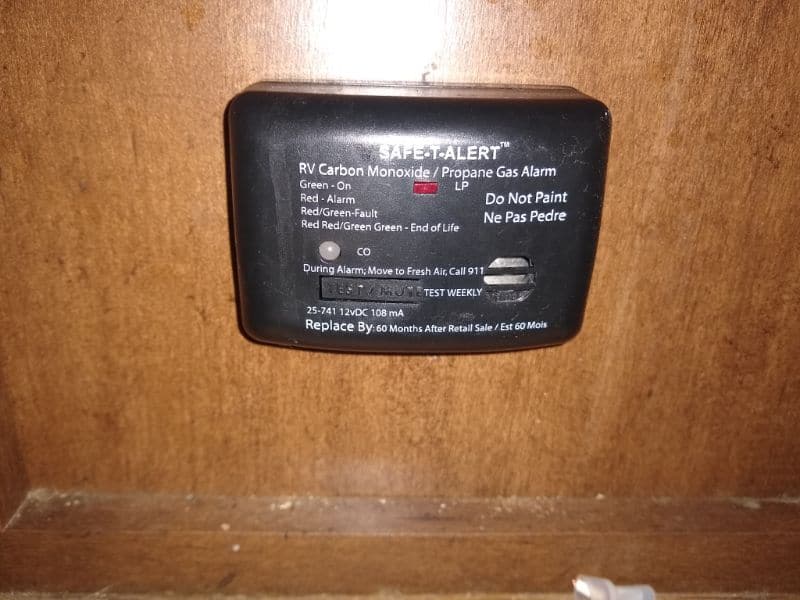
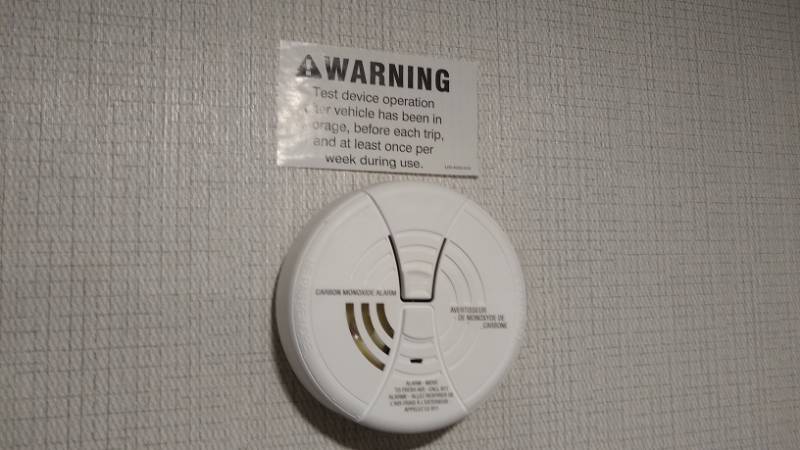
These alarms are required by NFPA codes.
- Propane gas is explosive at the lower explosive limit (LEL), which is 21,000 parts per million (ppm). Most RV detectors will beep at 10-25% LEL.
- Carbon monoxide causes hypoxia (lack of oxygen), shutting down many of your body’s critical systems. Carbon monoxide poisoning can result in death.
Usually, the smoke alarm is a battery-powered wall mount unit, while the LP and CO alarms are bundled together and connected to a hardwired circuit.
Not sure where to find yours?
- Smoke alarms are mounted high on the wall or furniture, within arms reach, usually close (but not too close) to the kitchen cooking area.
- LP/CO alarms are mounted close to floor level (within 4-20 inches) because propane gas sinks (carbon monoxide gas tends to disperse evenly around the room)
What Do My RV Propane Alarms Mean?
Every RV propane and/or carbon monoxide alarm has its own Sounder & Signal schedule. Please refer to your Owner’s Manual.
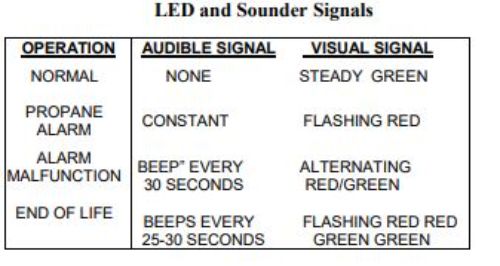
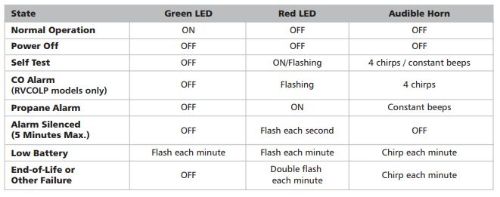
Why Does My RV Propane Alarm Keep Going Off?
1. Sprays and Solvents
LP/CO alarms are extremely sensitive. Many chemicals besides carbon monoxide or propane can set them off, including the below:
- Hairspray
- Paint and lacquer
- Industrial solvents
- Febreze
- Cleaning solutions
- Flatulence
- Carpet cleaners
Many aerosol products (e.g. dry shampoo) use propane as a propellant, which can activate your propane alarm.
Ventilating your RV should disperse these chemicals and deactivate the alarm. Do not spray or use these chemicals in close proximity to the alarm.
2. Low Electrical Voltage
Both battery-powered and hardwired units can suffer from low voltage. Old alkaline batteries, obviously, lose voltage over time. RV house batteries will lose voltage if over-discharged.*
(*If you’re connected to shore power and you’re still measuring low voltage, that could mean you have a bad converter!)
If your RV CO/LP alarm is measuring low voltage (usually between 8 and 10.5 volts), then the alarm will typically beep or flash until the voltage is increased. You likely need to recharge or replace your batteries. It’s extremely uncommon for an RV battery to reach 8 or 9 volts DC since a lead-acid battery is functionally “dead” at around 11.5 volts.
Most commercial RV propane units can handle anywhere from 8-16 or 9-15 volts DC. The CP/LO alarm will not beep until it detects a voltage at the low end of its range. The alarm may not operate reliably (or at all) at this voltage – so charge your batteries immediately!
3. Dust & Fuzz
A buildup of dirt, dust, and fuzz on the LP/CO detector has been known to cause false alarms. Using a vacuum cleaner with a soft bristle brush attachment, gently remove the dust and grime from the surface of the detector.
Do not use water or other cleaning solutions! The alarm can be damaged by water or chemicals.
4. End of Life
RV CO/LP alarms are rated for 5 or 7 years of use. After 5-7 years, most alarms will beep or flash an LED warning code to remind you to purchase a replacement unit.
You can usually press the TEST or RESET button on your detector to reset the end-of-life alarm for another three days. But don’t put it off! Get a replacement shipped online or from your local RV parts store.
(5) … Smoke Alarm?
At the risk of insulting your intelligence, are you 100% positive it’s the LP/CO alarm that’s making a noise? Have you confirmed the obnoxious offender isn’t your smoke alarm?
(6) … Curious Kids?
All alarms have a button for Test Mode. If you’re traveling with kids, do they know not to touch the alarm button? How about a curious pet nosing around?
An Actual Propane Leak!
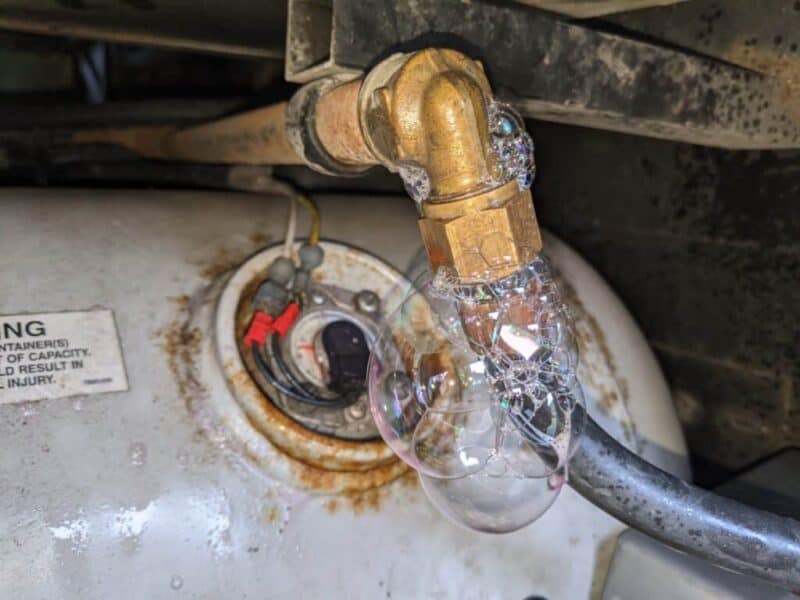
If none of the above apply … then you probably have a propane leak or carbon monoxide concentration!
If it’s a severe propane leak, you can probably smell it. Propane, which is naturally odorless, has an added odorant that smells like rotten eggs or sulfurous skunk. It’s quite potent. If you suspect a leak, use your sniffer! But sniff low to the ground – remember, propane is heavier than air and will sink to the floor.
However, some noses are better than others. And pooling propane can reach its LEL far before you smell it six feet above the floor! So don’t rely solely on your sense of smell for safety.
Here’s what to do if you suspect a propane leak:
- If you suspect a propane leak, quickly open the doors and windows. Extinguish any heat- or spark-producing equipment.
- Retreat out of the RV. Alert any neighbors nearby.
- Shut off the main propane tank valves. Stand far away from the RV.
- Call an RV technician. Seek assistance in diagnosing the source of the leak.
- If you test for a leak yourself, you can sometimes find leaks around fittings and hoses using a soapy water solution. Watch for bubbles with the propane turned on.
- For more information on propane safety and testing for leaks, read our guide here.
An Actual Carbon Monoxide Problem!
Warning: If you have a carbon monoxide problem, you can’t smell it. Carbon monoxide is odorless, tasteless, and non-irritating. You can’t sense it – but it can easily kill you.
Unless propane, carbon monoxide doesn’t “leak.” And you don’t produce it. You do produce carbon dioxide (CO2) and consume oxygen (O2) when you breathe, which can be dangerous in an airtight RV, but you don’t produce carbon monoxide (CO).
Instead, carbon monoxide is usually produced through incomplete combustion. Anything flame-burning produces carbon monoxide. This includes absorption refrigerators, gas cooktops, gas stoves, propane catalytic heaters, motor vehicle engines, and fuel-burning generators.
Here are five reasons you might have carbon monoxide in your RV:
- Exhaust leaks from either a vehicle engine
- Poor ventilation while using a portable gas-powered heater
- Generator fumes exhausting into the RV
- Using gas-powered burners for interior heating (a big bo-no!)
- Furnace, water heater or absorption refrigerator vents blocked, fumes escaping into the interior. Can also be caused by a stiff wind blowing exhaust fumes into the interior through an open window or other entry point.
If you suspect you have carbon monoxide in your RV, ventilate! Open all the doors and windows. Turn on a fan. Stand outside the RV if you have to.
Carbon monoxide builds up in the system. You can’t get enough oxygen, which can cause all sorts of problems: nausea, confusion, spasms, headaches, hallucinations, etc. If you are showing symptoms of CO poisoning, get to an ER immediately! Have someone else drive, if possible.
Whatever you do … don’t snip the wires. Don’t turn it off. Don’t uninstall the alarm and promise yourself “I’ll just replace it later.” It only takes a small propane leak to turn your RV into a bomb.
There are nearly 2,000 RV fires every year. More than 20,000 people a year visit the ER every year because of carbon monoxide poisoning. Don’t become the next one on the list!
Leave a Reply